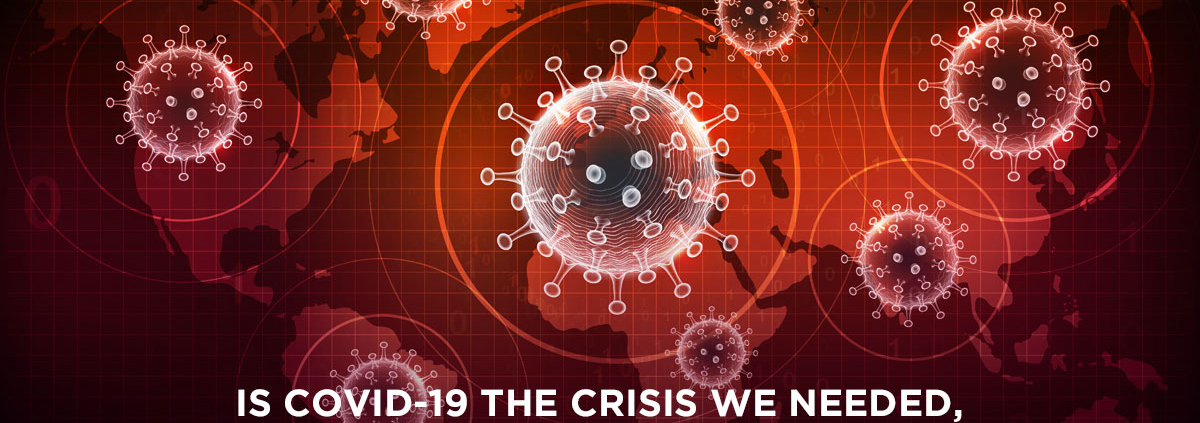There is much to celebrate about where humanity stands today. Millennia of progress, struggle and invention have brought us to the cusp of a new world of abundance. A world in which energy, food, infrastructure, healthcare, education and public utilities will be abundant, readily accessible and sustainably enabled.
However, the great disappointment of our age is not just that we are yet to successfully implement these breakthrough technologies and strategies. What should concern us most is that we have been unable to create a global society that ensures the fruits of such innovations are available to all.
It’s said that every crisis comes along with opportunities. This is certainly true of the COVID-19 pandemic. Challenges such as climate change, systemic inequality, widespread poverty, and many other injustices are a global issue. However, there was something a little unusual about the pandemic, in that, it was a threat that the entire world needed to address, together and at once. I believe that having survived this kind of moment in history, there is a unique opportunity for humanity to adopt a transnational, in fact global, perspective.
Seizing a moment that united all nations, races and creeds
Crisis creates clarity of thought. This is something we have all observed in our personal lives. For instance, take a moment to look this article(1), on the world economic forum website. It refers to several progressive initiatives that have been launched to make cities around the world greener, in the new normal.
Naturally, these changes should have been made, even if the pandemic had not occurred. But the stark truth is that they hadn’t been. It’s no exaggeration to say that many of us are more inclined to do the right thing, individually or collectively, at the ‘eleventh hour’, or when circumstances have forced us to look at issues in black and white. As a businessman and entrepreneur, I am certainly a fervent supporter of the free market approach to running an economy, but I am also a fervent supporter of creating a just and equitable world. I believe that the COVID-19 pandemic presents us with the perfect opportunity to tweak and redefine the way that our world is organized. Faced with a threat that suddenly emerged as the great leveller, between all people everywhere, we are in the ideal state of mind to discard the dysfunction that has crept into our systems. More importantly, in the aftermath of a crisis that made our shared humanity obvious to us all, we can collectively reimagine a fairer new social contract, which leaves no one behind.
In a recent interview with Bloomberg(2), Kristalina Georgieva, the Managing Director of the International Monetary Fund, went as far as to say that the COVID-19 pandemic was ‘a chance to fix capitalism’. And, I must say, I have to agree with this statement.
Chalking out the path ahead
Let’s be honest, reimagining our world is not just about coming to our senses, after facing an invisible but life threatening enemy. There is a real economic crisis, which we cannot overcome if we maintain a winner-takes-all, dog-eat-dog world. After months of lockdown and a complete breakdown of economic activity and production, it is not possible to simply turn on widespread consumer demand, by throwing a switch.
If the economy is to make a strong return to something like normalcy, it will do so on the basis of an inclusive growth. So how do we achieve this? I believe real resilience is about empowerment and a fairer sharing of profits, among all those who contribute to production. For example, one of the key ideas in Socialism is that workers should have greater equity in the profits that they generate through their labour. I would like to see a world in which we extend this idea to include the disparity between primary and secondary producers as well.
Whether it is a poor and underdeveloped nation, with abundant reserves of a rare earth mineral, or a poor farmer, whose produce is used by a mega-selling processed food brand, primary producers are getting a raw deal, in our current economy. Similarly, if there’s anything that the mad scramble for a COVID-19 vaccine has taught us, it’s that higher education, research and development need to be democratized, rather than being locked up behind a wall of patents and ownership rights. Technologies that have a direct global impact on sustainability, lifestyle enhancements, water and food security etc., need to freely and widely shared, without restriction. Researchers and inventors who develop these technologies should be able to accrue royalties, but such innovations should not be allowed to become monopolies under the control of corporations. International trade regimes and treaties are one of the main reasons that we continue to live in a world with such disparity. We need a global entity that all nations respect as a forum, to adjudicate the sharing of wealth across the entire value/supply chain – so that the promised benefit of globalization actually materializes in the lives of average ordinary people.
From new normal to new beginning
We are at a critical juncture in history. The entire world’s power centers – governments, international organizations, mega-corporations and opinion makers – have all been suitably chastened by a crisis that underlined our common humanity. Such moments are rare in history. As we re-emerge into the ‘new normal, let’s set an agenda that takes all 8.5 billion of us into account, rather than just the 1% at the top of the hill.
- https://www.weforum.org/agenda/2020/09/c40-cities-covid-19green-recovery/
- https://www.bloombergquint.com/global-economics/imf-s-kristalina-georgieva-says-covid-19-crisis-is-a-chance-to-fix-capitalism



